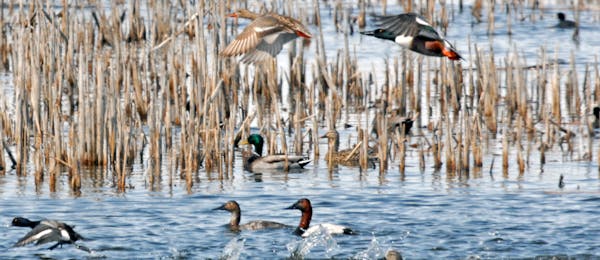A dispute erupted Tuesday over the hiring of a new executive director for a council that has helped spend more than $500 million of Legacy Amendment money on game, fish and wildlife habitat over the past five years.
Three of 12 Lessard-Sams Outdoor Heritage Council members, upset with a hiring process that presented them with only two finalists out of 35 job applicants, walked out of a council meeting at the Capitol in protest, saying they won't participate in the hiring process. A fourth council member also said he won't participate.
"This is one of the biggest decisions we have to make," said Sen. Bill Ingebrigtsen, R-Alexandria, who walked out. "This person could be with us for 10 or 12 years."
At issue is replacement of Bill Becker, executive director since the council's inception in 2009, who is retiring at the end of the year. Becker is paid about $107,000, and helps the council recommend to the Legislature how to spend $100 million annually to restore, protect and enhance wetlands, prairies, forests and wildlife habitat.
A 2008 sales tax hike approved by voters provides the funds, along with similar programs for clean water, parks and trails and the arts. Legislation passed the same year formed the council, made up of four legislators and eight citizens. Hunters and anglers said they wanted the council to oversee the habitat fund because they didn't trust the Legislature.
Some council members said they were surprised to learn on short notice that they were expected to fill Becker's job from the two finalists who were scheduled to be interviewed Tuesday.
"I would have more confidence if we would look at more than two candidates," said Scott Rall of Worthington. "This is a terribly important job." After votes to expand the candidate pool to five, and then to three, failed, Rall, Ingebrigtsen and Jim Cox walked out of the meeting. Bob Anderson of International Falls, who also supported having five candidates, stayed, but said later he, too, wouldn't participate in the interview process.
David Hartwell, council chairman, told members that the Legislative Coordinating Commission did the original screening of applicants, and cut the candidate list to four. A five-member panel of the council, which included Hartwell, asked the commission to add two others.
It did so, making the applicant pool six, but again trimmed the list to four. One candidate subsequently withdrew, leaving three. The five-member Lessard-Sams panel interviewed them last week and eliminated one candidate, leaving two for the full council to interview Tuesday.
The two finalists are Kevin Bigalke, district administrator for the Nine Mile Creek Watershed District, and Heather Koop, assistant director and project analyst manager for the Lessard-Sams council.
Members repeatedly said their desire to have more candidates wasn't a reflection on those two. Indeed, a majority hadn't talked to them.
"A lot of us are unhappy we're down to a flip of the coin," Ron Schara said. "Three would be better."
Said Hartwell: "I'm distraught we're at this place. It's certainly not what I was hoping for. I personally believe the process we followed made sense."
But Hartwell said he would reconsider his earlier vote and is willing to add the third finalist to heal the rift. The nine members still present voted 7-2 to interview all three candidates at a later date. Rep. Rick Hansen, DFL-South St. Paul, and Susan Olson of Austin voted no.
But Rall, Ingebrigtsen, Cox and Anderson said afterward that they want the full council to interview the five finalists for the job and still won't participate in the process if only three candidates are considered.
"At the end of the day, we want to hire the best person for the job,'' Rall said.
Hartwell had explained that the state's open meeting law dictated the process, because if a quorum of council members were to interview candidates, the meetings would be public. And some candidates wouldn't want their names public, he said. But the five-member council panel, which Hartwell appointed, didn't represent a quorum and could screen candidates at closed meetings.
"It's miserably difficult to do this with the open meeting law,'' he said.
Another dispute occurred over the types of questions council members can ask candidates. Cox and some others wanted to ask about the candidates' hunting and fishing backgrounds, but were told by state officials that wouldn't be inappropriate.
"We talk about hunting and fishing here all the time,'' Ingebrigtsen said. "Don't we want to know if they know about hunting and fishing?''
Doug Smith • 612-673-7667

